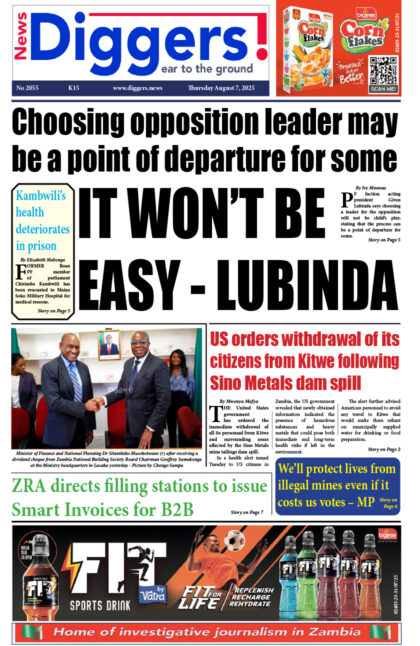“Lusaka Water and Sewerage Company (LWSC) would like to advise members of the public to ignore the message being circulated on social media claiming that water has been contaminated and that the utility has advised people to desist from consuming it. LWSC has not issued any notice of that nature and we would like to advise our customers to ignore that message. It is very clear that the message, which is from an anonymous source, is an attempt at alarming and causing unnecessary panic amongst members of the public”, read a statement from the water utility last week.
But merely a day after the Lusaka Water and Sewerage Company released this statement, denying that there was any water contamination in any parts of the capital city where they supply the commodity, it came to their attention that they were wrong and the social media alerts were accurate. Nyumba Yanga, NAPSA Complex, Malata Compound and parts of Ibex Hill had actually been badly hit by typhoid and other waterborne diseases.
To say that this was a poor way of handling a public relations issue is an understatement. This was beyond negligence of duty. Negligence of duty would be keeping quiet or doing nothing when reports are flying around that there is water contamination in the city. But encouraging members of the public to drink a commodity that is believed to be poisonous is an act of extermination.
Lusaka Water and Sewerage Company did not just deny that there was water contamination in the said residential areas; they actually went ahead to assure the vomiting victims that water was not a source of their sicknesses so it was safe for them to drink more of it. This is very annoying, and we are glad that a group of residents in the affected areas have taken legal action against Lusaka Water and Sewerage Company.
Like former State House press aide George Chellah rightly observed, in a typical old-fashioned public relations management style, Lusaka Water and Sewerage Company rushed to deny what they had not yet investigated. Meanwhile, scores of families were trooping to nearby hospitals and health centres desperately seeking medical help.
As if that was not enough mess on one crisis, we are further told by residents of NAPSA Housing Complex that the water utility actually lied about the measure it was claiming to have put in place to prevent the spread of contamination. When Lusaka Water and Sewerage Company came to admit that, indeed, there was water contamination in the areas, which they had declared safe, they claimed that they had doubled the dosage of chlorine in order to purify the water pipes and storage tanks. But when inspectors from the Ministry of Health visited the residents to test the water quality, the results revealed that there was no chlorine in the water at all!
This water contamination crisis speaks volumes about the capacity of Lusaka Water and Sewerage Company to provide safe drinking water to people. Zambians should no longer be surprised that Lusaka faces a cholera crisis every rainy season. Those employed to manage water sanitation are playing games with human life, printing useless statements from the comfort of their offices without having a clue on what it is truly happening on the ground. When the whole population rises to protest, that is when they step out to see the mess.
This careless manner of managing life-threatening problems is very dangerous and must be condemned in the strongest terms. Not even animals in a zoo deserve to be treated with this level of negligence. In fact, it would be a crime if a zookeeper subjected wildlife to poisonous food and the animals died. Lusaka Water and Sewerage company needs to put its house in order before their negligence leads to the much-dreaded cholera outbreak.
And this crisis mismanagement actually reminds us of how the PF government deals with similar situations, and there are lessons to be learnt here. The PF is also very good at this “dismiss first, get facts later” approach. It is a defence mechanism that has shamed everyone in this regime, including the President himself.
In today’s age, an institution cannot just dismiss a report as “social media gossip”. Social media has become a very strong tool for disseminating information, and government leaders, along with those culprits at Lusaka Water and Sewerage Company, should invest in some fact-checking training so they can know what to dismiss and what to take seriously. It is foolish to deny facts for the simple reason that the information was first heard on social media.
There is no journalist in the world today who can claim to have more detailed information on an issue than all the people on social media. In the same vein, there is no government leader anywhere in the world who can claim that they have better facts on a public matter than all the social media users.
This is a digital age, Zambians who come across vital information will not wait until they find a phone number for Paul Shalala at ZNBC so that the national broadcaster can share the information on its 19:00 hours news. Whistleblowers will simply publish what they know on social media and it is up to investigators to take a bite and verify.
Social media is not anyone’s enemy; it is a pool of data for everyone who has interest to dip in and make use of the information that is relevant to their interests. Only companies like Lusaka Water and Sewerage Company will disregard social media reports and face such avoidable humiliation. Bwana Patson Phiri, do your PR, but izi nzelu zaku sewerage zisale mu 2018.
























